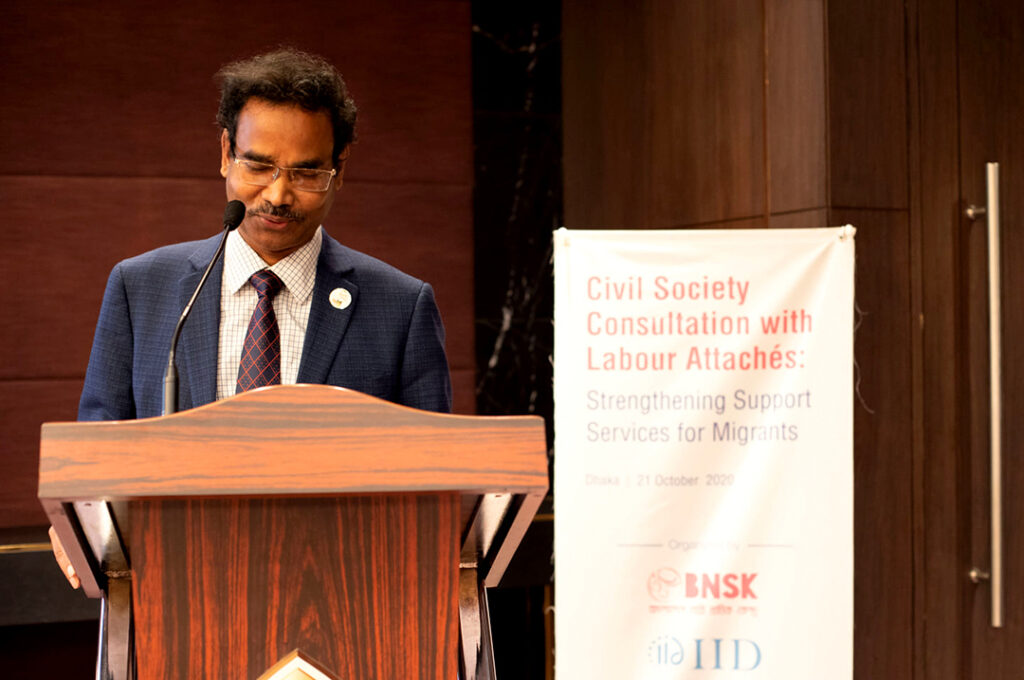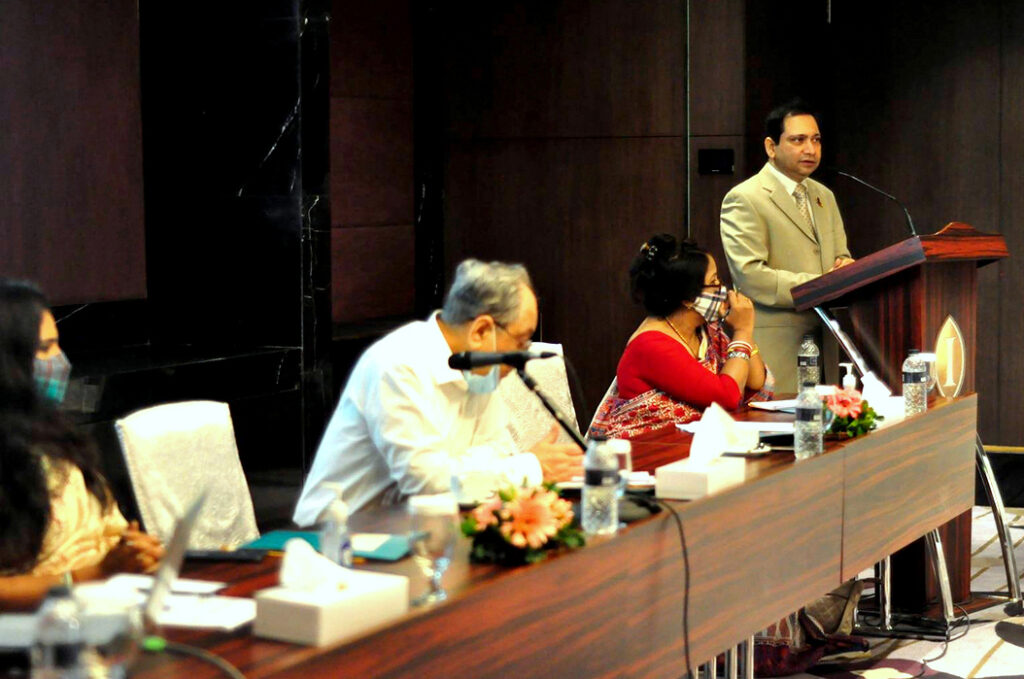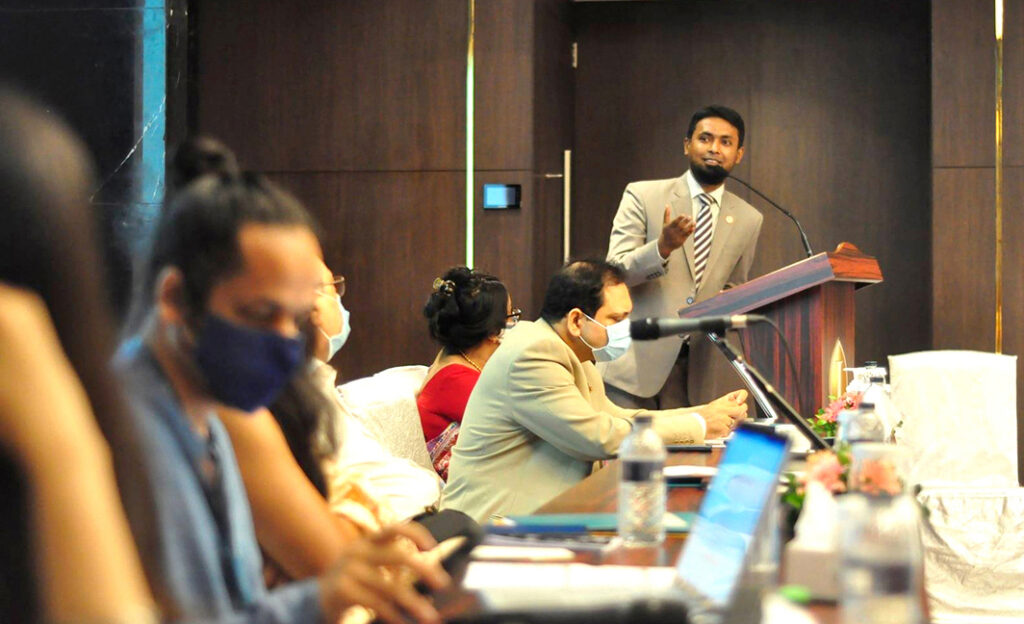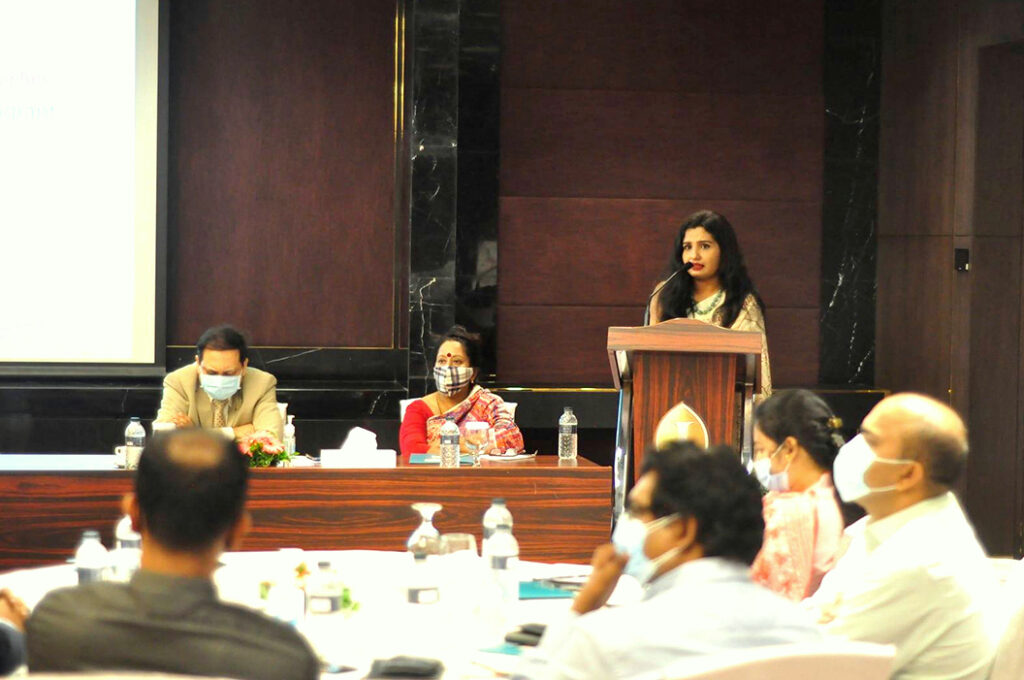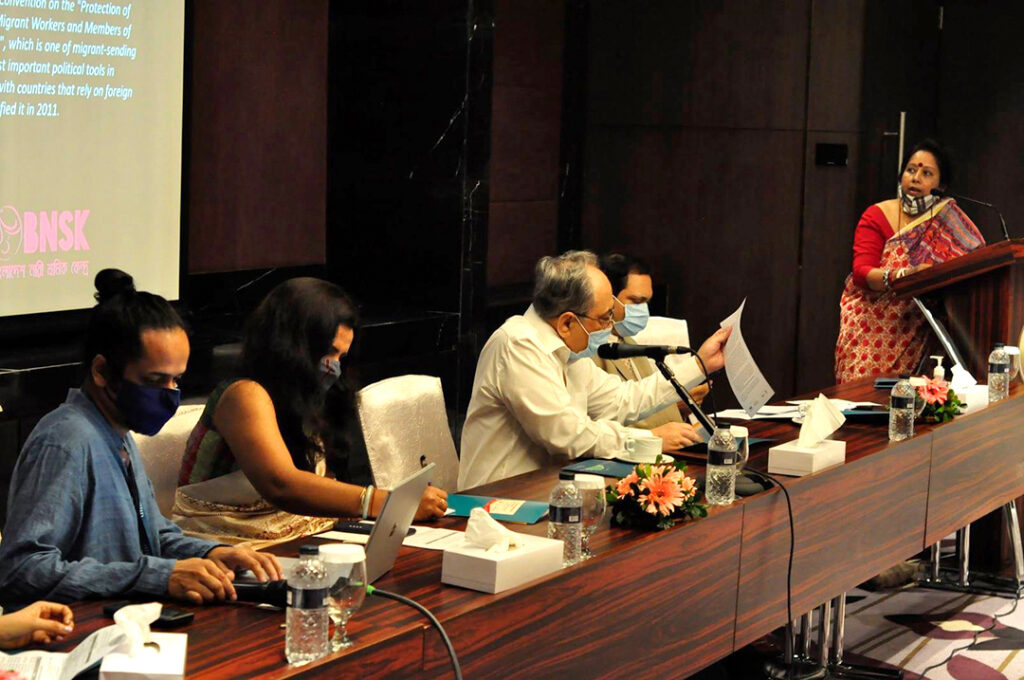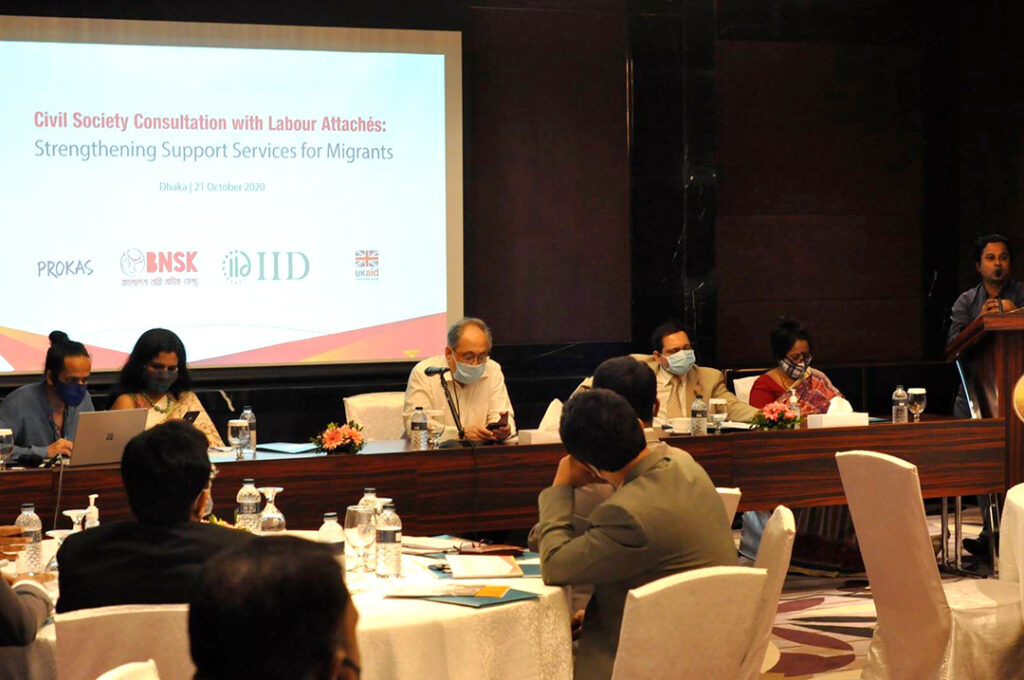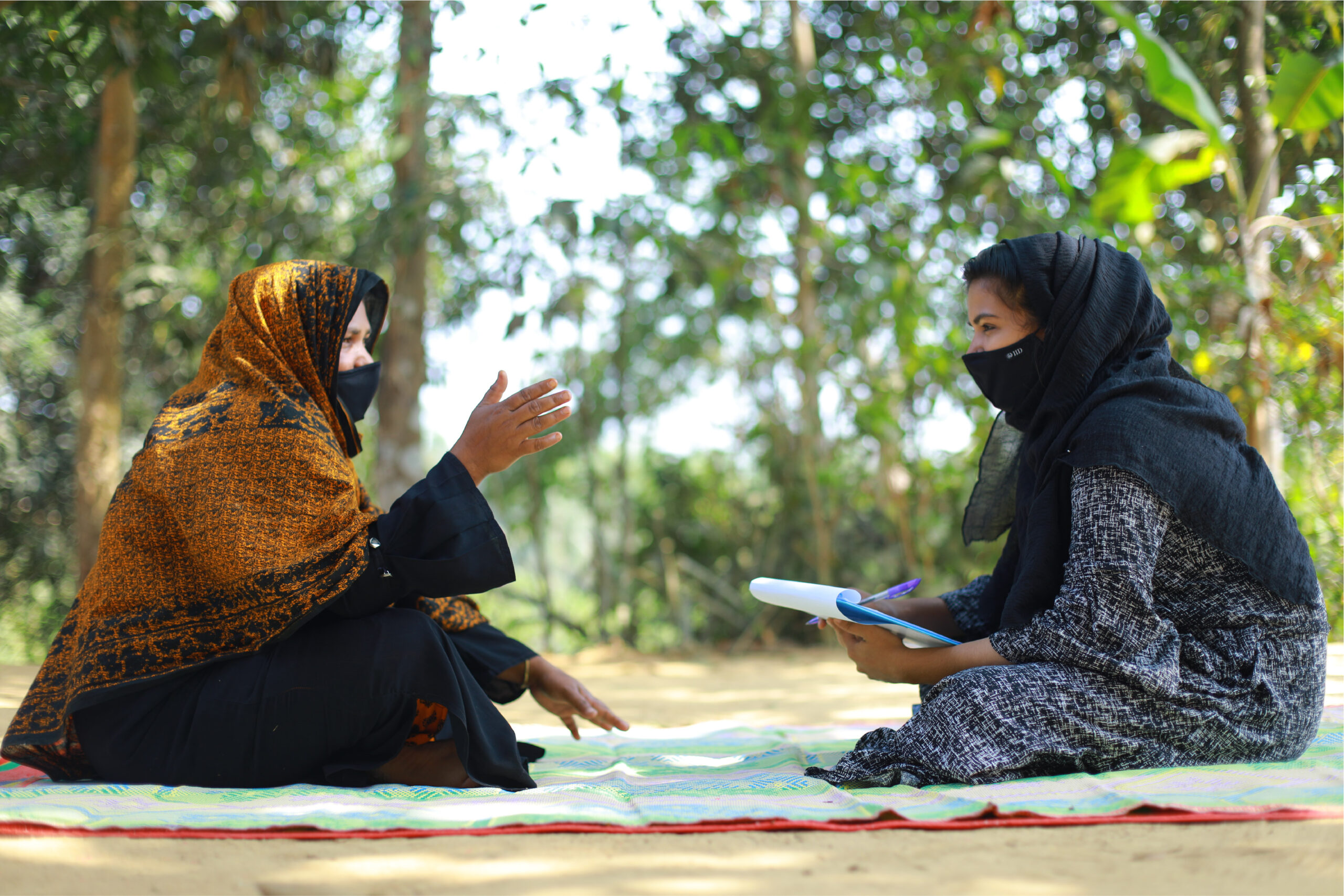Given the evolving nature of the support services needed for migrant workers during the pandemic and post-pandemic period, the partnership between civil society and Labor Attachés of Bangladesh missions abroad needs to be strengthened to scale up services for migrant workers in the destination counties.
In this context, the Standing Committee Chairman, Ministry of Expatriates’ Welfare and Overseas Employment, senior government officials, the newly appointed Labor Attachés, and civil society leaders joined together in a consultation program titled ‘Civil Society Consultation with Labor Attachés: Strengthening Support Services for Migrants’. The meeting was focused on the support services, particularly for the women migrant workers, recent trends in light of the pandemic, and how Bangladesh as a champion can develop better services through the Model Consulate in this regard.
The program was held on 21st October 2020 from 4:00 pm to 8:00 pm and jointly organized by IID and BNSK (in partnership with PROKAS and UKAid). It was organized into two segments and followed by networking over the dinner. This consultation is an addition to the long-standing partnership between IID and BNSK with the government in promoting service delivery and providing policy advocacy as a part of civil society at the national, regional, and global levels.
Hon’ble Chairman, Standing Committee to Ministry of Expatriates’ Welfare and Overseas Employment, Anisul Islam Mahmud M.P. pointed out the insufficient budget allocation for migrant’s welfare. Speaking as a chief guest he mentioned that as a nation we are not doing enough for these migrant workers even though we have enough resources to help them. The 1 crore migrant workers living overseas are equal to almost one-sixth of our total population. If these people were living in Bangladesh, then the state would have had to bear expenses for their accommodation, health services, food consumption, transportation and many more things. Currently, only 0.02% of the total budget is allocated for them; if we increase that to 0.2% that would make the amount 5000 crore taka. We do not even need that much, if we get just 1000-2000 crore, we can tremendously improve our services. The first thrust should be in countries where we have a tremendous amount of people, we should start with those embassies. He also addressed the exploitation of the female migrant workers and how the embassies can play a vital role to decrease their sufferings. He ended his speech by saying that we owe a lot to these migrant workers as they have immensely contributed to building our economy. We need to look after them, see that they do not suffer, think about their safety & security and how to end their sufferings. He lastly added that even if the labor attaches cannot solve everyone’s problems, they should receive everyone with a smile and that makes the difference.
Dr. Ahmed Munirus Saleheen, Secretary of the MoEWOE (Ministry of Expatriates’ Welfare and Overseas Employment), addressed the word Infodemics in explaining the phenomenon of the overflow of information which is affecting us largely these days. Instead of solving a problem, it could create more problems. He stressed the importance of creating change in the mindset of the service providers, a significant change in the traditional service mentality is needed. He identified the service mentality of our country as a cultural problem rather than the administrative or bureaucratic problem. The system does not service friendly rather it revolves around the power circle and often there is a chance of power exploitation. With the emerging new generation, this mentality is changing. The new generation possesses a broader mindset and perspective and is more humanist.
Mr. Nazrul Islam, DG, MoFA stated that strengthening support services for women migrants and contemporary issues in service delivery and promoting best practices are both overlapping and important for both attaché and the expatriates. He stressed that Bangladesh has many things to be proud of regarding the migrant issues. Such as Bangladesh single-handedly negotiated for the SDG 10.7 goal which is the Global Compact for migration and got consent from more than 107 countries. Addressing the labor attachés he said that though migration is an important tool of development, it is not mandatory for anyone. It is voluntary and nobody should go abroad if there is no work for them. That will be a bad decision for the migrant worker and his/her family. The labor attaché can present a clear picture to the people who are seeking jobs abroad.
Mahjabeen Khaled, former MP and Member, Parliamentary Caucus on Migration and Development advocated that the poor response from the hotline and helpdesk needed to be improvised by using technology. She also mentioned email, text message services can be included instead of the helpdesk. Along with that, by using IT and innovation a central system can be introduced that will be managed from Dhaka and will give the solution to the primary problem faced by migrants. She also suggested the following countries like Sri-Lanka, the Philippines who are working great on migration. She added that the skill of migrant workers should be advanced from lower scale to semi and higher scale to enlarge the migrant job market. She mentioned that rather than focusing on only Middle Eastern countries we need to explore other countries.
As a representative of the labor attache, Md Arifuzzaman, the first Secretary of labor of Jeddah also spoke at the event. He stressed on communication gap as one of the restrictions to delivering support services and legal support to migrant workers especially female migrants for their welfare. He stressed that the teamwork of the officers of different wings is capable of mitigating the service gap between the receiver and the provider. He added that as a servant of the Republic of Bangladesh he and his fellow colleagues are committed to their duties to achieve the targets of vision 2021.
Md.Shamsul Alam, DG, BMET mentioned the challenges which will be faced by labor attachés while working at the embassies and suggested building a strong mindset to deal with that and support migrants with courage. He also stated that the social cost of migration is very high so by working together we can offer better opportunities for the labor migrants.
Md. Saiful Hassan Badal, MD, BOESL recommended the labor attachés to serve the labor migrants responsibly with love, affection. He also encouraged the partnership between CSOs and the government for ensuring the welfare of the migrants.
Gerry Fox, Team Lead of PROKAS, reiterated that it is high time for CSOs and the government to work together and use ideas such as the coordination of information with the vast opportunity of social media for better sharing and bring immediate justice to the migrant’s inquiries and Model Consulate approach to reach a greater number of migrants with better support facilities.
Zakir and Rijwan, migrant workers in Abu Dhabi and Singapore have complained about rude behavior and insincerity of the embassy staff. They reported that they have to wait long hours to get their work done. According to both Zakir and Rijwan, things would get done quicker if the embassy staff showed a little concern and they want the government to look into the matter.
Syeed Ahamed, CEO of IID, highlighted the scope of CSOs and Labor Attachés partnership/ public-private partnership/ CSO-government partnership. He presented findings of an undergoing study of IID on migrant’s discussion in social media during the pandemic and discussed how the lack of information leading the migrates toward infodemic. He called for the partnership of Labor Attachés to ensure accurate information distribution among migrants. Emphasizing on the low budget for migrant worker’s welfare, he also proposed a partnership to implement frugal innovation to provide basic support services to the migrants through organizing best practice forums with the labor attachés. A model consulate approach will be developed through an adaptive, inclusive, and collective forum with a public-private partnership.
Shirin Lira, PROKAS/British Council emphasized the biggest challenges and gaps in the labor migration area which is women labor workers because they disproportionately live in vulnerable situations. Intersectionality is used to identify the challenges and situations of female migrant workers where female domestic migrant workers remain the most exposed. She stresses capacity-building training and orientation on international law and the legal system needed to arrange for the labor attaches when they go abroad for their services. When a female worker comes with an accusation the labor attaches need to know how to file cases and make the victim’s obligation stronger so that next time the employer cannot exploit any other worker.
Sumaiya Islam, Executive Director of BNSK discussed the policy and framework of Bangladesh for the welfare of migrant workers and by sharing the best practices support services of Nepal, Sri Lanka, and the Philippines, she highlighted where the public-private partnership is needed to strengthen our support services. She urged to increase budget allocation to ensuring support services specifically medical support and 24/7 help desk in the destination country both for documented and undocumented migrant workers. She proposed that it will be possible to ensure safe and labor-friendly migration if CSOs and Labor Attachés work together.
Anisul Islam Mahmud MP was the chief guest of the inaugural session and Dr. Ahmed Munirus Saleheen was the chief guest of the concluding session of the event. Syeed Ahamed from IID and Shirin Lira from PROKAS/British Council moderated the two segments of the program, respectively. Among others, Shariful Hasan, Program Head, BRAC Migration, Shakirul Islam, Chairman, OKUP, Syed Saiful Haque, Chairperson, WARBE DF, and Jasiya Khatoon, Director WARBE DF; spoke at the event. Including 9 newly appointed labor attachés, a total of 30 participants from different public-private organizations were present at the event.

